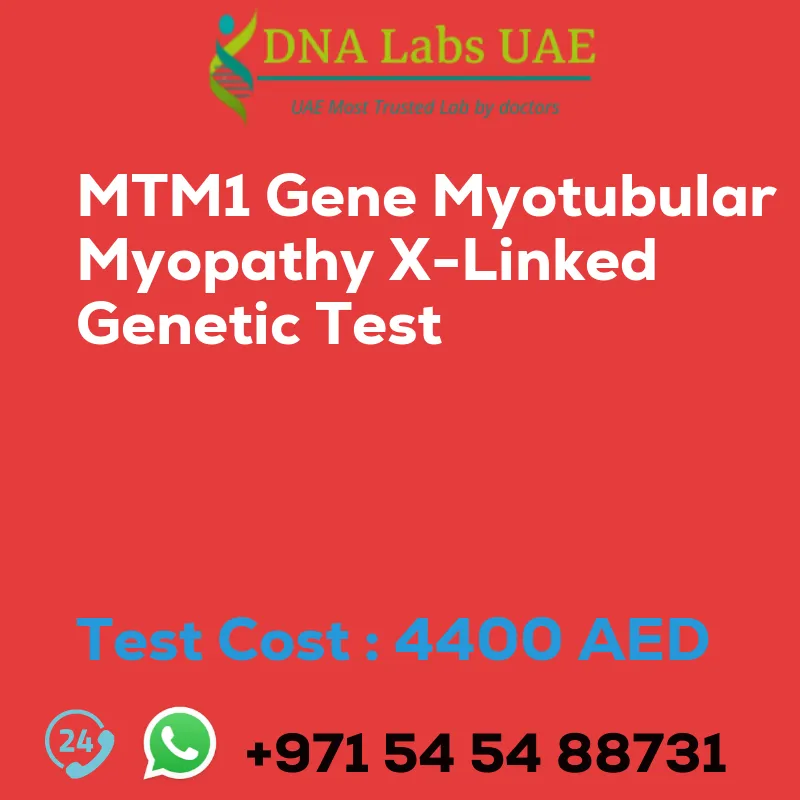MTM1 Gene Myotubular Myopathy X-Linked Genetic Test
At DNA Labs UAE, we offer the MTM1 Gene Myotubular Myopathy X-Linked Genetic Test. This test is designed to diagnose myotubular myopathy, a rare genetic disorder characterized by muscle weakness and decreased muscle tone. The test focuses on the MTM1 gene, which is associated with this condition.
Test Components and Price
The MTM1 Gene Myotubular Myopathy X-Linked Genetic Test is priced at 4400.0 AED. The test requires a blood sample or extracted DNA, or one drop of blood on an FTA card.
Report Delivery and Method
After the sample is collected, the report will be delivered within 3 to 4 weeks. The test utilizes NGS (Next-Generation Sequencing) technology, which allows for the simultaneous analysis of multiple genes.
Test Type and Doctor
The MTM1 Gene Myotubular Myopathy X-Linked Genetic Test falls under the category of neurological disorders. It is recommended to consult with a neurologist for this test.
Test Department and Pre-Test Information
The test is conducted in our Genetics department. Before undergoing the MTM1 Gene Myotubular Myopathy X-Linked NGS Genetic DNA Test, it is important to provide the clinical history of the patient. Additionally, a genetic counseling session will be conducted to draw a pedigree chart of family members affected by MTM1 Gene Myotubular Myopathy X-Linked.
About Myotubular Myopathy and NGS Genetic Testing
Myotubular myopathy is a rare genetic disorder primarily affecting males. It is characterized by muscle weakness and decreased muscle tone. NGS genetic testing is a cutting-edge technology that allows for the analysis of the MTM1 gene and the identification of any mutations or variations that may be present. This testing can confirm a diagnosis of myotubular myopathy and provide valuable information about the specific genetic variant involved.
Understanding the underlying cause of the condition can help predict disease progression, inform genetic counseling and family planning decisions, and potentially guide treatment options and management strategies.
It is important to note that NGS genetic testing for myotubular myopathy may not be available in all healthcare settings. Referral to a specialized genetic testing laboratory may be required. Additionally, it is crucial that genetic testing is performed and interpreted by trained healthcare professionals who can provide appropriate counseling and support.
| Test Name | MTM1 Gene Myotubular myopathy X-linked Genetic Test |
|---|---|
| Components | |
| Price | 4400.0 AED |
| Sample Condition | Blood or Extracted DNA or One drop Blood on FTA Card o |
| Report Delivery | 3 to 4 Weeks |
| Method | NGS Technology |
| Test type | Neurological Disorders |
| Doctor | Neurologist |
| Test Department: | Genetics |
| Pre Test Information | Clinical History of Patient who is going for MTM1 Gene Myotubular myopathy X-linked NGS Genetic DNA Test A Genetic Counselling session to draw a pedigree chart of family members affected with MTM1 Gene Myotubular myopathy X-linked |
| Test Details |
The MTM1 gene is associated with a condition called myotubular myopathy, which is a rare genetic disorder characterized by muscle weakness and decreased muscle tone. It is an X-linked disorder, meaning it primarily affects males. NGS (Next-Generation Sequencing) genetic testing is a type of genetic testing that uses advanced sequencing technology to analyze multiple genes simultaneously. In the case of myotubular myopathy, NGS genetic testing can be used to analyze the MTM1 gene and identify any mutations or variations that may be present. By identifying mutations in the MTM1 gene, NGS genetic testing can help confirm a diagnosis of myotubular myopathy and provide information about the specific genetic variant involved. This information can be useful for understanding the underlying cause of the condition, predicting disease progression, and informing genetic counseling and family planning decisions. It can also potentially guide treatment options and management strategies. It’s important to note that NGS genetic testing for myotubular myopathy may not be available in all healthcare settings and may require a referral to a specialized genetic testing laboratory. Additionally, genetic testing should always be performed and interpreted by trained healthcare professionals who can provide appropriate counseling and support. |








